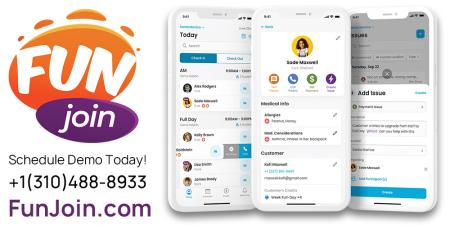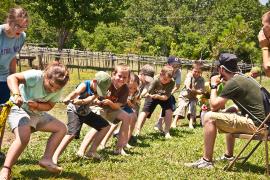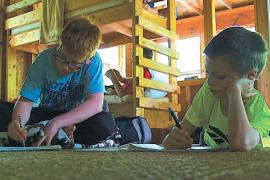In my decades-long career as a camp professional and outdoor educator, one of my favorite parts has been problem-solving. How can I, in whatever role I find myself, help make the camper experience magical? That is where continuous quality improvement (CQI) comes in. Through CQI processes in camp settings, I’ve learned about the power of equity, social and emotional learning (SEL), and how to create spaces where campers and staff feel like they belong and can be their authentic selves, sometimes for the first time ever. By embedding CQI into our camps, we can help to ensure that staff and young people have access to ongoing processes and supports that can lead to magical camp experiences.
Since 2020, the American Camp Association (ACA) has partnered with the Forum for Youth Investment’s Weikart Center for Youth Program Quality (aka the Forum’s Weikart Center) to support a cohort of camps in a Community of Practice to implement a quality improvement process at their camps, known as the Camp Program Quality Initiative (CPQI). The Community of Practice is free and open to camps running summer and year-round programming. It offers regular training and webinars to support camps throughout all stages of programming, from hiring and training to camp sessions and beyond summer.
What Is Continuous Improvement?
If you search “continuous improvement” on the internet, you’ll find a lot of ideas about what it means — a quest for perfection, getting to a root cause, and an ongoing effort to improve processes and results. In a camp setting, you can focus on continuous improvement anywhere — from improving marketing to better coordinating drop-off and pickup, to the ideal schedule for staff training. You can also include logistics, management, safety, programming, and operations. And while continuous improvement is incredibly important to the successful operation of any camp, continuous quality improvement is a process that sometimes gets overlooked as camps focus on the operational and logistical details that help camps run safely and seamlessly.
What Is Continuous Quality Improvement?
CQI is an ongoing cyclical process to improve young people’s experiences. The four phases of the process — Prepare, Assess, Plan, and Improve — include performance assessment, data-driven improvement planning, supports for improvement implementation, and reassessment to measure results. To support camps in measuring program quality and making meaningful changes at the point of service (where young people and camp professionals interact), ACA adopted a CPQI process.

Figure 1: The four phases of CQI. © 2022 The Forum for Youth Investment
ACA partnered with the Forum’s Weikart Center to help camps implement CQI, which is both a process (illustrated in Figure 1) and a mindset. To make the process inclusive, all roles within the camp ecosystem — including camp professionals, campers, families, boards, and community members — are encouraged to contribute ideas.
Why Does Quality Matter?
To understand why camp program quality is so important, let’s consider the QuEST Model from the Forum’s Weikart Center, a theory of change. QuEST is an acronym (illustrated in Figure 2) that describes the connection between the quality of campers’ experiences at camp and the ultimate outcomes we hope that camp experiences support.

Figure 2: QuEST Model. © 2022 The Forum for Youth Investment
The higher the Quality of the interactions between camp professionals and campers, the more likely campers will Engage with the activities and experiences camps provide — including formal skill-building activities and during informal times. As young people participate in high-quality camp programming, they learn new Skills, including social, emotional, and cognitive skills, and develop beliefs about their skills and abilities. With time and practice, those skills can Transfer outside of the camp setting to campers’ everyday lives at school, work, and in the community.
One of my first counselor-in-training (CIT) participants, Sharon, learned to rock climb as part of our day camp programming. She became a competent belayer, helping to teach and mentor campers. After she finished her CIT summer, we hired her to help with our climbing programs in the community. Sharon’s skills improved to the point where she joined a climbing gym in her college town. When we connected after she had graduated, she thanked me for helping her get her first post-college job — at a climbing gym in Boston. The skills she learned at camp were part of her tool kit as she became the first person in her family to go to college, helping her work through challenges in the same way she might think about moving past a difficult move when climbing or while coaching a climber to go a little higher in one of our programs. Sharon, now a successful data analyst who graduated from Harvard, is still rock climbing today.
High-quality camps use a process like the CPQI and the Prepare-Assess-Plan-Improve cycle, along with a tool that measures easy-to-implement best practices: the Social and Emotional Learning Program Quality Assessment (SEL PQA) for Camp.
What Does the SEL PQA for Camp Measure?
The SEL PQA for Camp measures the quality of staff and camper interactions at camp and provides a set of research-validated best practices that support environments to be safe, supportive, interactive, and engaging for young people. To get an idea of how measurement using the SEL PQA for Camp works in practice, let’s look at an example from my former program where we introduced campers to driving draft horses, along with best practices (items) from the SEL PQA for Camp that focus on how staff scaffold tasks for optimal learning.
Scaffolding Learning, Item 1
Staff break down difficult tasks into smaller or simpler steps, which are outlined or explained to campers before they begin.
When campers met Sid and Tracy, a team of 2,000-pound Percheron draft horses, we started with the basics. First, we covered horse safety and helped students understand the steps for being around two large, gentle horses, including where to stand, where not to stand, how to approach, and how to think like a draft horse. Next, we taught campers how to groom and harness the team. Each step of the process, from choosing the correct brush to buckling and snapping the harness in the right order, was broken down before we had campers try it. Asking open-ended questions such as, “What do you think happens next?” or “What do you know about the steps required?” are ways to involve campers in thinking through the steps, problem-solving, or using their previous knowledge or experience.
Scaffolding Learning, Item 2
Staff model skills for all campers.
When we taught campers how to harness a draft horse, one of my favorite demonstrations was helping them learn about the horse’s collar, which was a big, heavy, leather oval. I’d pass that collar around and ask the campers if they knew which way was up and which way was backward. Once they figured it out, I’d slip the collar over the horse’s head so they could see it, and then they’d put the collar on the second horse. If campers had been to camp with us before, I always asked one of them to demonstrate for me, which they loved doing.
Scaffolding Learning, Item 3
Staff encourage all campers to try out skills or attempt higher levels of performance.
When campers are hesitant, like some are around a 2,000-pound horse, or they’ve done the activity before and can put the horse’s harness on in the dark, how do staff encourage everyone to participate? Sometimes campers need time to wait and watch before they are ready to join in. Other campers may need a smaller first step to get them started — such as approaching the horse, petting a shoulder, and then stepping back. Other campers may need opportunities to be responsible for a task or be given leadership opportunities to help them participate productively. Campers with previous experience often enjoy being asked to demonstrate a task, lead the activity, or support another camper who might feel nervous or unsure.
Scaffolding Learning, Item 4
As campers try each step, the staff monitors and states a level of challenge.
How do you make sure you create the right conditions for each camper to learn? For some campers, just stepping inside the pasture could be an important step. For others, lifting the heavy harness over the collar by themselves might be the perfect level of challenge. Even if campers don’t participate the way you might envision, you can make sure they are challenged in a way that promotes learning and encourages them to take the next step when they feel ready.
What Supports Does ACA Provide for CPQI?
ACA’s trainings, supports, and Community of Practice are free and available for camps that want to learn how to imagine solutions and consider how to measure the best practices for camp staff in their support of and interaction with campers, as well as organizational practices to support camp professionals. Upcoming opportunities to engage include:
- PQA Basics, February 2023 at the ACA National Conference: An opportunity to learn about the CPQI process and how to use the SEL PQA for Camp for self-assessment, a process where camp staff gather data by observing activities, taking notes, and conducting interviews.
- Camp Program Quality 101, February 2023 at the ACA National Conference: An overview of the SEL PQA for Camp and high-quality structural practices for your camp.
- Camp Program Quality Institute, April 2023: A new opportunity to experience camp and the best practices in the SEL PQA for Camp as a participant and an observer/coach before implementing the self-assessment process at your own camp in the summer.
- 2023 CPQI Cohort: A Community of Practice to learn about best practices for data collection, staff training, and other topics to get you ready for summer.
- Planning with Data, Fall 2023: Look back on the data collected during summer and start the improvement process as you begin preparing for summer 2024.
No matter what the data says about the opportunities for improvement in your camp program, the CPQI process will give you the tools you need to have conversations about quality that enable you to home in on the best practices that have the most positive impact on the camper experience. Ultimately, it will support you to ensure that your camp staff create a safe and supportive environment for campers to learn and lead.
For more information on how to become involved in the Camp Program Quality Initiative, email [email protected], or register for the in-person PQA Basics workshop offered as a preconference session at the ACA National Conference in Orlando, Florida, on February 20, 2023.
Steph Love, MS, Experiential Education, is a senior learning and development specialist with the Forum for Youth Investment’s Weikart Center for Youth Program Quality. She is an international trainer, facilitator, coach, and outdoor educator with over 25 years of experience leading youth development and outdoor education programs at ACA-accredited camps and in out-of-school time programs.




